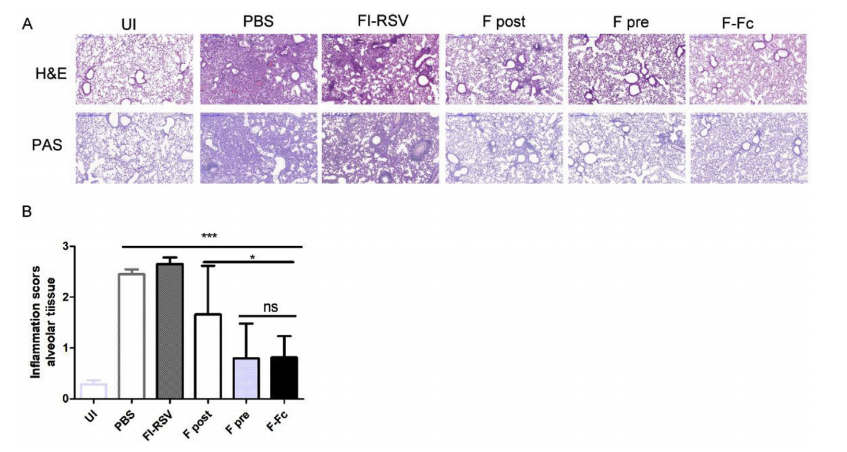Researchers suggest the F-Fc protein being a safe and effective RSV vaccine candidate
Date:04-06-2019 | 【Print】 【close】
Respiratory syncytial virus (RSV) is the leading cause of viral bronchiolitis and pneumonia in infants worldwide. Nearly all children are infected with RSV at some point, and individuals can be repeatedly re-infected with RSV throughout life. RSV infection can cause severe respiratory tract inflammation in susceptible young children, the elderly and immunosuppressed individuals, resulting in an appreciable global economic burden.
One of the main target populations of RSV vaccines is younger individuals, and a formalin-inactivated whole-virus vaccine (FI-RSV) given intramuscularly resulted in enhanced respiratory disease (ERD), particularly in the youngest age cohort, immunized between 2 and 7 months of age. Development of an effective RSV vaccine has faced many obstacles and challenges. Despite decades of intensive research, there is still no licensed vaccine.
In a recent study, the research group led by Prof. XIAO Gengfu in Wuhan Institute of Virology of the Chinese Academy of Sciences developed a novel vaccine antigen, RSV glycoprotein F fused with an IgG Fc fragment (F-Fc).
The researchers constructed an F-Fc fusion protein and found that though the primary sequence of F in F-Fc is the same as that of post-fusion F, the F-Fc fusion protein can be recognized by the conformation-specific antibody D25.
In this study, compared with that of post-fusion F vaccination, the F-Fc vaccine strategy could further benefit RSV-specific neutralizing antibody generation and improve protective Th1-biased cellular immune responses. These immune responses conferred resistance to viral replication, reduced lung pathology and effectively reduced pro-inflammatory cytokines and chemokines in the lung after RSV challenge.
In summary, their study suggests that the F-Fc fusion protein could be a safe and protective vaccine candidate for reducing lung injury caused by RSV infection.
Their study was published in Antiviral Research entitled “A novel RSV F-Fc fusion protein vaccine reduces lung injury induced by respiratory syncytial virus infection”.
This work was supported by grants from the National Key R&D Program of China and National Natural Science Foundation of China.

Immunization with the F-Fc protein reduces lung injury. Image by XIAO Gengfu
Contact:
XIAO Gengfu
E-mail: xiaogf@wh.iov.cn
Wuhan Institute of Virology, Chinese Academy of Sciences, Wuhan 430071, China. (http://english.whiov.cas.cn/)